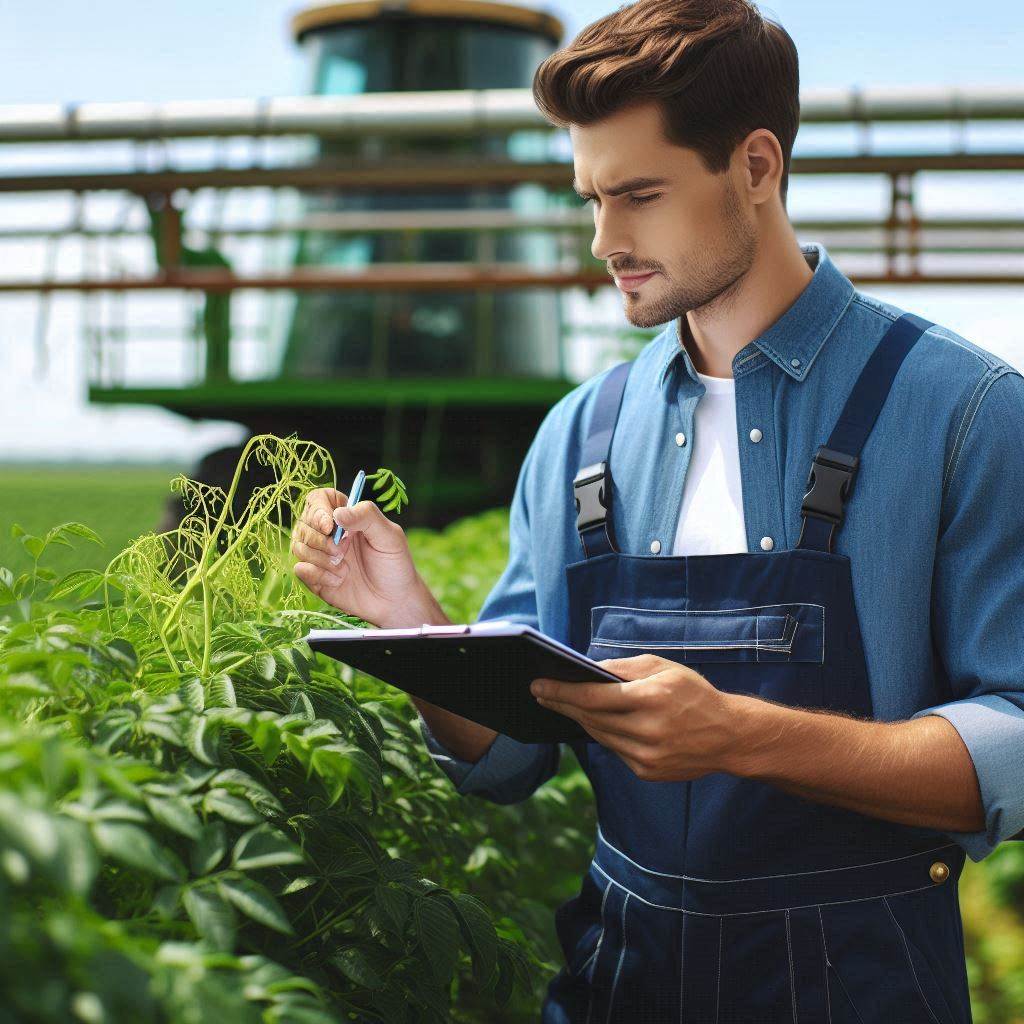Introduction
Agricultural engineering plays a pivotal role in enhancing modern agriculture by integrating technology and innovation.
This field encompasses various specializations and fields that cater to the diverse needs of the agricultural sector.
One of the primary specializations in agricultural engineering is agricultural machinery and equipment.
Engineers in this field work on designing, developing, and testing machinery to improve efficiency and productivity in farming operations.
Another critical specialization is irrigation and water management.
Agricultural engineers focus on creating sustainable water systems to ensure proper irrigation for crops, maximize water usage, and minimize wastage through innovative techniques and technologies.
Food processing and post-harvest technology is another important area within agricultural engineering.
Engineers work on developing methods to preserve, process, and package agricultural products efficiently to increase shelf life, reduce post-harvest losses, and enhance food safety.
Bioenergy and biofuels are emerging fields in agricultural engineering that focus on developing renewable energy sources from agricultural waste and bio-resources.
Engineers work on creating sustainable solutions to reduce dependence on fossil fuels and promote environmental sustainability.
Precision agriculture is a specialized field that utilizes technology such as GPS, drones, and sensors to optimize farming practices.
Engineers in this area focus on data-driven decision-making to enhance crop yields, reduce inputs, and minimize environmental impact.
Overall, agricultural engineering specializations and fields play a crucial role in addressing the challenges faced by modern agriculture and ensuring sustainable practices for the future.
Agronomy and Crop Science
Focus on Improving Crop Production and Management
Agricultural engineers focus on improving crop production and management.
They develop technologies and practices to enhance crop yield and quality.
Their work includes designing efficient irrigation systems, optimizing planting techniques, and integrating advanced machinery.
These engineers aim to increase productivity while reducing environmental impact.
They work closely with farmers to implement innovative solutions that address specific agricultural challenges.
By improving crop management practices, they help ensure food security and sustainability.
Research on Crop Varieties, Soil Health, and Crop Rotation Methods
Research is central to advancing crop production.
Agricultural engineers investigate various crop varieties to identify those best suited to different climates and soil types.
This research helps in selecting crops that yield better under specific conditions.
Soil health is another critical area of study.
Engineers analyze soil properties and conditions to recommend appropriate fertilizers and amendments.
Maintaining soil health ensures optimal growth and minimizes the risk of soil degradation.
Crop rotation methods are also a key focus.
Engineers study how rotating different crops affects soil nutrients and pest populations.
Effective crop rotation enhances soil fertility and reduces the need for chemical inputs.
Importance of Agronomy in Sustainable Agriculture Practices
Agronomy plays a vital role in sustainable agriculture.
This field combines plant science and soil management to promote environmentally friendly farming practices.
Agricultural engineers use agronomic principles to design systems that improve efficiency and sustainability.
Sustainable agriculture practices aim to minimize the negative impact on the environment.
Engineers incorporate methods such as precision agriculture and conservation tillage to reduce resource use and environmental degradation.
By focusing on sustainable practices, agricultural engineers help preserve natural resources and protect ecosystems.
Their work supports the development of resilient farming systems that can adapt to changing environmental conditions.
Agricultural engineers focus on enhancing crop production and management through innovative technologies and practices.
They conduct research on crop varieties, soil health, and crop rotation methods to improve agricultural outcomes.
Agronomy is essential for promoting sustainable agriculture practices, ensuring environmental protection, and supporting food security.
Through their expertise, agricultural engineers contribute to the advancement of sustainable and efficient farming practices.
Agricultural Machinery and Equipment
When it comes to Agricultural Machinery and Equipment.
Agricultural engineers play a crucial role in designing and developing machinery for various agricultural activities such as planting, harvesting, and processing crops.
Here are some key aspects of Agricultural Machinery and Equipment specialization:
Design and Development of Machinery for Planting, Harvesting, and Processing Crops
Agricultural engineers specialize in designing and developing machinery for planting, harvesting, and processing crops.
These engineers create equipment that improves efficiency and productivity on farms.
They design planting machines like seed drills and planters that ensure uniform seed placement.
Harvesting machinery, such as combines and harvesters, is engineered to efficiently gather crops and minimize losses.
Processing equipment is also crucial.
Agricultural engineers develop machinery for cleaning, sorting, and packaging crops.
This equipment helps maintain crop quality and prepares products for market.
Engineers focus on optimizing these machines to handle varying crop types and sizes, enhancing their versatility and performance.
Use of Robotics and Automation in Modern Agricultural Equipment
Robotics and automation have revolutionized modern agricultural equipment.
Engineers incorporate robotic systems to perform repetitive tasks with precision and speed.
Automated planting systems use GPS and sensors to plant seeds at optimal depths and spacing.
These systems reduce manual labor and increase planting accuracy.
Robotic harvesters are another innovation.
They can operate in diverse conditions, harvesting crops efficiently while minimizing damage.
Automation extends to processing as well.
Machines equipped with advanced sensors sort and package crops, improving processing speed and consistency.
These technologies also include drone systems for monitoring crop health and applying treatments.
Drones collect data on crop conditions, which helps in making informed decisions.
Robotics and automation streamline farming operations, making them more efficient and less labor-intensive.
Role of Agricultural Engineers in Enhancing Efficiency and Productivity on Farms
Agricultural engineers play a crucial role in enhancing efficiency and productivity on farms.
They design and implement systems that optimize agricultural practices and resources.
By developing advanced machinery and automation solutions, engineers address challenges such as labor shortages and crop yield limitations.
Engineers analyze farm operations and identify areas for improvement.
They integrate technology that reduces waste, conserves resources, and increases crop yields.
For example, precision agriculture techniques use data-driven insights to apply water, fertilizers, and pesticides more effectively.
Collaboration with farmers is key.
Engineers work closely with agricultural professionals to understand their needs and develop solutions that fit specific farm conditions.
This partnership ensures that the technology meets practical needs and delivers tangible benefits.
Agricultural engineers specialize in designing machinery for planting, harvesting, and processing crops, enhancing farm efficiency and productivity.
Robotics and automation have transformed modern agricultural equipment, improving precision and reducing labor.
Engineers play a vital role in integrating these technologies, optimizing farm operations, and boosting productivity.
Their innovations ensure that agriculture can meet growing demands while addressing challenges and improving overall efficiency.
Soil and Water Conservation Engineering
Soil and Water Conservation Engineering is a key agricultural engineering specialization that focuses on sustainably managing soil and water resources for agriculture.
Strategies for Reducing Erosion and Improving Soil Quality
Reducing erosion and improving soil quality are vital for sustainable agriculture.
Engineers develop various strategies to combat soil erosion.
One approach involves planting cover crops, which protect the soil from wind and water erosion.
These crops help in maintaining soil structure and fertility.
Another strategy is implementing terracing, which creates stepped levels on slopes to slow water runoff.
Terraces reduce soil erosion and enhance water infiltration.
Additionally, engineers use erosion control blankets and geotextiles to stabilize soil and prevent erosion.
Improving soil quality involves practices such as crop rotation and organic matter addition.
Crop rotation reduces soil depletion and pest buildup, while organic matter, like compost, enriches the soil.
These practices enhance soil structure, nutrient availability, and moisture retention.
Development of Irrigation Systems for Efficient Water Usage
Efficient water usage is crucial for modern agriculture.
Agricultural engineers design and develop irrigation systems that optimize water distribution.
Drip irrigation is one such system that delivers water directly to plant roots, reducing wastage and increasing efficiency.
Sprinkler systems are another option, suitable for larger areas.
Engineers design these systems to ensure even water distribution and minimize runoff.
Advanced irrigation technologies, such as soil moisture sensors, help in scheduling irrigation based on actual water needs.
Engineers also focus on integrating rainwater harvesting techniques into irrigation systems.
Collecting and storing rainwater reduces dependence on groundwater and provides an additional water source.
Efficient irrigation systems contribute to water conservation and improve crop yields.
Importance of Conserving Natural Resources for Sustainable Agriculture
Conserving natural resources is fundamental for sustainable agriculture.
Engineers and farmers work together to implement practices that protect resources like soil, water, and energy.
Sustainable practices ensure that agricultural activities do not deplete or degrade these resources.
Soil conservation techniques, such as reduced tillage and organic farming, help in preserving soil health and structure.
Water conservation methods, including efficient irrigation and rainwater harvesting, reduce water usage and protect water sources.
Using renewable energy sources and reducing waste also contribute to sustainability.
Sustainable agriculture practices aim to balance productivity with environmental stewardship.
By conserving natural resources, farmers can maintain healthy ecosystems and ensure long-term agricultural viability.
Engineers play a key role in developing and implementing technologies that support sustainable practices.
Strategies for reducing erosion, improving soil quality, developing efficient irrigation systems, and conserving natural resources are essential for sustainable agriculture.
Engineers design solutions to combat erosion, optimize water usage, and protect resources.
These efforts ensure that agriculture remains productive and environmentally responsible.
By focusing on these areas, agricultural engineers contribute to a sustainable future for farming and food security.
Read: Top Cities for Electrical Engineering Jobs in America
Transform Your Career Today
Unlock a personalized career strategy that drives real results. Get tailored advice and a roadmap designed just for you.
Start NowFood Processing and Storage
Food processing and storage are crucial aspects of agricultural engineering.
Engineers in this field focus on developing innovative solutions for processing and preserving food products to ensure their safety and quality.
Let’s delve into the role of agricultural engineers in this specialization:
Engineering solutions for processing and preserving food products
Agricultural engineers play a critical role in designing and implementing engineering solutions for processing and preserving various food products.
They work on developing technologies and systems that can efficiently handle food processing activities, such as cleaning, sorting, packaging, and labeling.
Engineers design equipment and machinery tailored to specific food processing needs.
Considering factors like the type of food product, processing requirements, and desired output.
These solutions aim to streamline food processing operations, increase productivity, and improve overall efficiency in the production process.
Focus on food safety and quality control measures
Ensuring food safety and quality is a top priority for agricultural engineers specializing in food processing and storage.
They are responsible for implementing strict quality control measures and adhering to regulatory standards to prevent contamination, spoilage, and other food-related hazards.
Engineers develop and implement food safety protocols, including sanitation practices, and monitoring procedures to maintain the freshness and integrity of food products.
They conduct regular inspections and quality tests to identify and address potential risks that could compromise the safety and quality of the food supply.
Role of agricultural engineers in ensuring food supply chain efficiency
Agricultural engineers play a crucial role in optimizing the food supply chain to ensure efficiency and sustainability.
They work closely with food manufacturers, distributors, and retailers to streamline the flow of food products from production facilities to consumers.
Engineers design and implement logistical solutions to improve transportation, storage, and distribution processes within the food supply chain.
They also focus on reducing waste, minimizing losses, and enhancing overall supply chain performance to meet growing consumer demand and market requirements.
In general, food processing and storage are essential fields in agricultural engineering that require innovative solutions, strict quality control measures.
Agricultural engineers play a pivotal role in ensuring the safety, quality, and sustainability of the food supply for a growing global population.
Read: Decoding the Ethics & Responsibilities of US Civil Engineers

Environmental Engineering in Agriculture
Mitigating Environmental Impacts of Agriculture, Such as Pollution and Greenhouse Gas Emissions
Agricultural engineers work to mitigate the environmental impacts of agriculture, including pollution and greenhouse gas emissions.
They develop technologies and practices to minimize the release of harmful substances into the air, water, and soil.
This effort includes designing systems to reduce chemical runoff and emissions from farming operations.
They also focus on improving the efficiency of agricultural machinery and processes.
By optimizing these systems, engineers help lower the carbon footprint of agricultural activities.
This work is crucial for reducing the industry’s contribution to climate change.
Development of Sustainable Farming Practices
The development of sustainable farming practices is a key area of focus for agricultural engineers.
They design and implement methods that conserve resources and promote ecological balance.
These practices include precision agriculture, which uses technology to optimize inputs like water and fertilizer, reducing waste and environmental impact.
Conservation tillage is another practice promoted by agricultural engineers.
It involves minimal soil disturbance, which helps maintain soil structure and health.
This method also reduces erosion and improves water retention in the soil.
They also encourage the use of renewable energy sources in farming, such as solar and wind power.
Integrating these energy sources into agricultural systems reduces reliance on fossil fuels and lowers greenhouse gas emissions.
Importance of Balancing Agricultural Productivity with Environmental Preservation
Balancing agricultural productivity with environmental preservation is essential for sustainable development.
Agricultural engineers strive to enhance crop yields while protecting natural resources and ecosystems.
They develop integrated pest management strategies that reduce the use of harmful chemicals, protecting both crops and the environment.
Water management is another critical aspect.
Engineers design irrigation systems that maximize water use efficiency, reducing wastage and preserving water resources.
They also advocate for the use of drought-resistant crop varieties to adapt to changing climate conditions.
Soil conservation techniques are crucial for maintaining long-term agricultural productivity.
Engineers promote practices like crop rotation and cover cropping to preserve soil fertility and prevent erosion.
These methods help maintain the soil’s health and productivity, ensuring sustainable agricultural outputs.
Agricultural engineers play a vital role in mitigating the environmental impacts of agriculture.
Developing sustainable farming practices, and balancing productivity with environmental preservation.
Their work helps reduce pollution and greenhouse gas emissions while promoting efficient use of resources.
By focusing on sustainable practices, agricultural engineers contribute to the long-term health and productivity of agricultural systems.
Ensuring that farming can meet current and future demands without compromising environmental integrity.
Read: From Intern to Lead: Climbing the Software Ladder in the US
Uncover the Details: CAD Technician Success Stories and Interviews
Explore Further: Career Pathways in Biomedical Engineering
Biotechnology and Genetic Engineering
Application of Biotechnology in Developing Improved Crop Varieties
Biotechnology plays a crucial role in developing improved crop varieties.
Agricultural engineers and scientists use biotechnological techniques to enhance the genetic makeup of plants.
This field focuses on creating crops that are more resilient to environmental stresses and diseases.
Through biotechnology, engineers can introduce desirable traits into plants.
These traits include drought tolerance, improved nutritional content, and resistance to pests.
The development of these improved varieties helps farmers achieve better yields and ensures food security.
Biotechnology also facilitates the rapid development of new crop varieties.
Traditional breeding methods are time-consuming, but biotechnological techniques accelerate the process.
This innovation is vital for adapting to changing environmental conditions and meeting the needs of a growing global population.
Genetic Modification for Pest Resistance and Increased Yield
Genetic modification (GM) is a specific application of biotechnology in agriculture.
Agricultural engineers use GM to enhance pest resistance and increase crop yield.
By inserting specific genes into a plant’s DNA, they create crops that can withstand pests and diseases.
Pest-resistant crops reduce the need for chemical pesticides, which can have harmful environmental impacts.
This resistance helps protect crops from damage, leading to higher yields and more stable food production.
Additionally, genetic modification can enhance a plant’s ability to absorb nutrients, further boosting yield and crop quality.
Engineers also use GM to develop herbicide-tolerant crops.
These crops allow farmers to control weeds without damaging the main crop, simplifying weed management and improving efficiency.
Genetic modification thus plays a critical role in modern agriculture, contributing to sustainable farming practices and food security.
Ethical Considerations and Debates Surrounding Genetic Engineering in Agriculture
The use of genetic engineering in agriculture raises important ethical considerations and debates.
One concern is the safety of genetically modified organisms (GMOs) for human consumption and the environment.
While scientific studies generally support the safety of GMOs, public skepticism remains.
There are also concerns about biodiversity.
Critics argue that GMOs can lead to the dominance of certain crop varieties, reducing genetic diversity.
This reduction could make crops more vulnerable to diseases and pests in the long term.
Intellectual property rights related to GMOs also spark debate.
Large biotech companies often patent genetically modified seeds, which can limit farmers’ access and increase costs.
This situation raises questions about the fairness and accessibility of agricultural technologies.
The ethical debates surrounding genetic engineering involve balancing innovation with safety, equity, and environmental stewardship.
Ongoing dialogue and transparent regulation are essential to address these concerns and ensure responsible use of biotechnology in agriculture.
The application of biotechnology and genetic modification in agriculture has led to significant advancements in developing improved crop varieties.
These technologies offer benefits such as pest resistance, increased yield, and more efficient farming practices.
However, they also raise ethical considerations and debates, particularly regarding safety, biodiversity, and access to technology.
As agricultural engineering continues to evolve, it is crucial to address these ethical concerns and ensure that biotechnological advancements benefit society as a whole.
Read: The Journey: How to Become an Architect in the USA.
Showcase Your Business Today
Reach thousands of readers actively exploring professional services. Publish your business profile and grow your audience now.
Publish NowPrecision Agriculture
Precision agriculture is a specialized field that involves the use of technology, such as GPS and drones, to enhance farm management practices.
Farmers can make data-driven decisions that optimize crop production and increase efficiency.
Use of Technology, Such as GPS and Drones, for Precise Farm Management
The use of technology in agriculture has transformed farm management practices, making them more precise and efficient.
GPS and drones are key tools in this transformation.
GPS technology allows farmers to map fields accurately, monitor soil conditions, and manage crop planting with precision.
Drones equipped with sensors and cameras provide detailed aerial views of fields.
They help in monitoring crop health, detecting pests, and assessing water stress.
Drones can quickly cover large areas, providing real-time data that is crucial for making informed decisions.
These technologies enable precise application of inputs such as fertilizers and pesticides.
Farmers can target specific areas that need attention, reducing waste and improving efficiency.
This precision in farm management leads to better resource use and improved crop yields.
Data-Driven Decision-Making for Optimizing Crop Production
Data-driven decision-making is at the heart of modern agriculture.
The integration of technology in farming allows for the collection of vast amounts of data.
This data includes information on weather patterns, soil health, crop growth, and market trends.
Farmers use this data to make informed decisions about planting, irrigation, and harvesting.
For example, analyzing soil moisture data helps in scheduling irrigation more efficiently.
Crop health data can indicate the need for pest control or nutrient application.
Data analytics tools and software enable farmers to predict outcomes and plan for various scenarios.
This proactive approach helps in optimizing crop production and reducing risks.
By leveraging data, farmers can enhance productivity and sustainability in their operations.
Benefits of Precision Agriculture in Reducing Input Costs and Environmental Impact
Precision agriculture offers significant benefits in reducing input costs and environmental impact.
By using technology to apply inputs more accurately, farmers can minimize the use of water, fertilizers, and pesticides.
This targeted approach not only saves money but also conserves resources.
Reducing the use of chemical inputs is beneficial for the environment.
It decreases the runoff of harmful substances into water bodies and reduces soil degradation.
Precision agriculture practices promote sustainable farming by minimizing negative environmental effects.
Additionally, precision agriculture enhances soil health by preventing overuse of fertilizers and improving crop rotation strategies.
Healthier soil supports better crop growth and reduces the need for intensive farming practices.
This leads to more sustainable and resilient agricultural systems.
The use of technology, such as GPS and drones, in precise farm management, along with data-driven decision-making, is revolutionizing agriculture.
These advancements enable more efficient use of resources, optimize crop production, and reduce input costs.
Precision agriculture also significantly reduces environmental impact, promoting sustainability in farming practices.
As agricultural technology continues to evolve, its role in enhancing productivity and sustainability will only grow, benefiting both farmers and the environment.
Gain More Insights: How to Stay Updated in the Network Engineering Field
Discover More: Innovations Shaping Automotive Engineering
Conclusion
In the vast field of Agricultural Engineering, specializations include: Farm Structures and Environmental Control, Agricultural Equipment Design, Soil and Water Conservation systems.
Other specializations are Agricultural Power and Machinery, Irrigation and Drainage Engineering, and Food Process Engineering.
Agricultural engineers play a critical role in developing technologies for sustainable agriculture.
They ensure efficient use of resources.
These engineers work to create solutions that address global challenges like food security and climate change.
The future of agriculture depends heavily on advancements made by agricultural engineers.
They are instrumental in shaping the industry.
Aspiring engineers should consider a career in agricultural engineering to make a positive impact on the world.
By choosing this field, individuals can contribute to the development of innovative solutions for modern agricultural challenges.
In closing, agricultural engineering offers a wide range of specializations that are crucial for sustainable agriculture and future food security.
Agricultural engineers’ work is vital in shaping the future of the industry, making their role indispensable for a thriving agricultural sector.
[E-Books for Sale]
The Big Book of 500 High-Paying Jobs in America: Unlock Your Earning Potential
$19.99 • 500 High-Paying Jobs • 330 pages
Explore 500 high-paying jobs in America and learn how to boost your career, earn more, and achieve success!
See All 500 High-Paying Jobs of this E-Book
1001 Professions Without a Degree: High-Paying American Jobs You Can Start Now
$19.99 • 1001 Professions Without a Degree • 174 pages
Discover 1001 high-paying jobs without a degree! Unlock career tips, skills, and success strategies for just $19.99!




